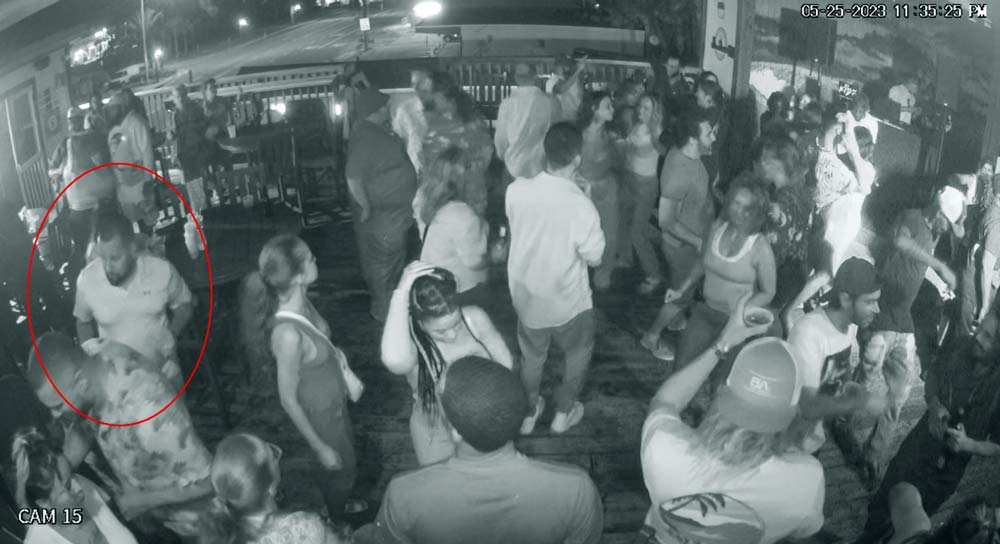
Michael Breckwoldt, the 20-year veteran of the Flagler County Sheriff’s Office who was in charge of the agency’s narcotics unit until last May, was demoted from sergeant to corporal and placed on last-chance probation for a year and a half as a result of an incident at Finn’s Beachside Pub in Flagler Beach, where Breckwoldt’s drinking led to “offensive behavior,” in violation of agency policy, and where he behaved in an unbecoming way toward patrons.
The findings were the result of an internal investigation Sheriff Rick Staly ordered after initial reports that the Flagler Beach Police Department was investigating Breckwoldt on a patron’s allegation of battery and abuse of power. Flagler Beach police concluded that while Breckwoldt had behaved poorly, he had not broken laws or acted criminally. No charges were filed. That investigation done, the internal affairs investigation began.
Breckwoldt also saw his pay reduced by an annual $5,792 (his salary after the demotion is $86,951) and lost the privilege of taking his agency-issued patrol car home for six months. He attended a month-long treatment program and passed a fitness-to-duty evaluation. He is no longer in charge of the narcotics unit. He will serve as a detective in the Major Case Unit.
The attenuated discipline is a reflection of Breckwoldt’s record with the agency, including 30 award commendations over his career and a rating of “excellent” on his most recent employee performance evaluation. The penalty is similar to that served on Rob Myers exactly a year ago, after Myers was found to have been drinking, driving, passing extremely close to a deputy who was on an unrelated roadside traffic stop, and subsequently treating that deputy demeaningly. Myers was demoted from corporal to deputy and placed on 18 months’ probation.
The investigation is brief, relying mostly on Finn’s surveillance video (without sound), Flagler Beach Police Department extensive investigative reports and recorded interviews Flagler Beach police detective Rosanna Vinci conducted with patrons involved in the incident and Finn staffers. Breckwoldt had declined, through his attorney, to be interviewed for the Flagler Beach investigation. His attorney invoked a right usually afforded public employees not to answer questions during their own internal investigation. The right does not apply to outside investigations. But Vinci did not press the issue.
Breckwoldt did take part in a recorded interview for the sheriff’s internal affairs investigation, which was conducted by Cmdr. Gerald Ditolla. he attributed his behavior to stress resulting from a “controlled buy” earlier that afternoon–when detectives execute a controlled operation with an informant who buys drugs from a dealer–and said he knew he’d been drinking, but did not remember “what, how much or any details pertaining to drinking.” (A receipt shows he had four Jameson whiskey shots and two Michelob beers, and was aware enough to leave a 20 percent tip when he checked out at 1:10 a.m. the morning of May 26).
Ditolla reported that Breckwoldt “vaguely remembers a couple things about the evening but said he was ‘pretty out of it’ so he cannot tell me any details about the evening because he cannot recall them.” Breckwoldt told the investigator he was not making any excuses for the evening. He only recalled that he’d met his family at J.T.’s Seafood Shack in the Hammock earlier, and his family had remarked that he looked fatigued. He then left his family to go to Finn’s. Ditolla reported there was no evidence Breckwoldt was impaired when he drove to Finn’s.
“Sgt. Breckwoldt is apologetic and is not making excuses or hiding from it,” Ditolla reported in the internal investigation. “He indicated he did have a drinking problem and was able to manage it and keep it hidden throughout the years. Sgt. Breckwoldt told me he had an issue with drinking and was not able to deal with it himself, and used alcohol to deal with stresses of his job.”
Innumerable studies underscore the link between law enforcement stress, post traumatic stress disorder and a higher incidence of drinking. “One of the important occupational hazards of police work is frequent exposure to traumatic incidents and the resulting risk of developing symptoms of posttraumatic stress disorder (PTSD),” one such study published by the National Institutes of Health states. “A strong body of empirical evidence demonstrates that rates of alcohol use disorders are significantly higher in individuals with PTSD, compared with trauma-exposed individuals without PTSD, and non-exposed community samples, raising concerns about PTSD-related alcohol co-morbidity in police officers.”
Read Related Also: DEADLY DAY CARE: 3rd Suspect Arrested in Daycare Fentanyl Poisoning Case
The problem has long been recognized, but so has the presumption that law enforcement officers dealing with those difficulties are responsible for ensuring that their interactions with the public are insulated from their consequences.
By the time the internal affairs interview was conducted, on Aug. 1, Breckwoldt had been through an in-patient Shatterproof treatment program for first responders and had not had a drink since the night at Finn’s. Breckwoldt told Ditolla he was taking the incident seriously and accepting consequences. He’d written an email to the sheriff on May 26, apologizing for his actions.
Flagler County Sheriff’s personnel are not barred from drinking off duty, or even from getting somewhat drunk. But the agency’s policy states that employees “shall refrain from consuming intoxicating beverages to the extent that results in offensive behavior, which discredits the agency, or renders the personnel unfit to report for their next regular tour of duty.” Breckwoldt violated that policy, the investigation found, as he did that on “unbecoming conduct.” He had also taken his agency-issued vehicle to Finn’s, and presumably would have driven it after drinking there, had he not had a “courtesy ride” home provided by law enforcement.
The incident at Finn’s centered on interactions and confrontations with Lance Redding, a patron at the bar who told authorities Breckwoldt had bumped into him and demanded that Redding buy him a Jameson drink–and that he would do so, if Redding knew who Breckwoldt was. Redding, who is Black, had long ago had some run-ins with local law enforcement on minor matters. One of the staffers at Finn’s, Austin Chewning, was previously a local law enforcement officer who’d had interactions with him, and who’d spoken with Breckwoldt that evening. It’s not known what Chewning and Breckwoldt spoke about. But Breckwoldt’s interactions with Redding started after that.
The Flagler Beach investigation, based on surveillance video, found no evidence of an aggressive bump, only some touching by Breckwoldt that was more along the lines of seeking Redding’s attention. The investigation also concluded that there’d been no abuse of power. But another patron, a woman, who witnessed the interactions, also complained that Breckwoldt had behaved inappropriately toward her, touching her repeatedly even after she told him to stop.
Of the patrons at Finn’s, Ditolla reached only Redding by phone. “Redding said he felt it was wrong, but does not want to pursue criminal charges because
everyone makes mistakes and had nothing else to share,” Ditolla reported.
“It is my responsibility to protect the public’s trust in our agency,” Sheriff Rick Staly was quoted as saying when the agency released the internal affairs investigation late the afternoon of Aug. 29, when the county’s attention was focused on Hurricane Idalia preparations. “I was extremely disappointed to learn of Breckwoldt’s behavior while off-duty that tarnished the image of our hard-working men and women of the Sheriff’s Office and the public image of our agency. But I also recognize that alcohol abuse occurs in the law enforcement profession caused by the many stresses of the profession and the human violence law enforcement officers often see and deal with on a daily basis. Sometimes, employees make the wrong choices to cope with the stress of law enforcement despite the available resources and resiliency programs made available. I’m glad to see that he is committed to his treatment program and was cooperative and apologetic and we wish him success. However, if any future violation occurs, his employment will be terminated.”
![]()
Breckwoldt IA_Redacted








